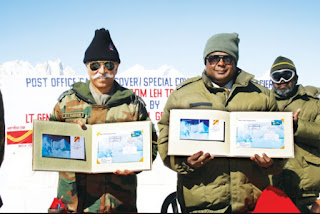Background. Siachen Glacier, the highest battlefield in the world and one of the longest glaciers outside the polar region, is located in the eastern Karakoram range in the Himalayas between the Saltoro Ridge to the west and the main Karakoram range to the east and north. It emanates from Indira Col, runs for approximately 76 km in a south easterly direction to the source of the Nubra River. 'Sia' in Balti language refers to the rose family plant and 'Chun' refers to any object found in abundance. Thus, the name Siachen refers to a land with an abundance of roses. There are four important passes on the Saltoro Range, namely Sia La, Bilafond La, Chulung La and Gyong La. The heights are between 12,000 and 21,000 feet and the area is characterized by high altitude mountainous terrain which is glaciated and remains snow bound throughout the year. The temperatures in the region dip as low as minus 75 degrees centigrade with wind speeds touching up to 50 knots.
During the 1970s and early 1980s, Pakistan permitted several mountaineering expeditions to the Siachen heights in an attempt to reinforce their claim on the area as they issued permits and, in many cases, sent a liaison officer of the Pakistan Army to accompany the teams. However, prior to 1984, neither India nor Pakistan had any permanent presence in this area.
Op Meghdoot was launched in April 1984 by the Indian Army, and it pre-empted the Pakistan Army that had planned for the occupation of the Saltoro Watershed by a force called as the 'Burzil Force' and the operation code named Operation Ababeel. It defeated the designs of the Pakistan Army and occupied the Siachen Glacier.
The soldiers who defend the glacier are known as Siachen Warriors.
Several attempts since 1984 have been made by Pakistan to dislodge Indian troops from their positions but have always been thwarted at the cost of precious lives lost by the Pakistan Army. The weather conditions and the enemy actions however have had their toll on the soldiers in this inhospitable and isolated battlefield.
Special Postal Cover and Carried Postal Cover.
Special Covers are those that can be commemorated by the Department of Post and can be cancelled with a special cancellation at the post office selected for the purpose. These normally bear postage stamps equivalent to the minimum inland letter mail rate.
Carried Postal Covers. Their history dates back to ancient times when letters or messages were sent through pigeons and parrots and graduated to use of elephants, camels and horsemen.
4th October 2011 was a historic day in Philately for India when probably for the first time in the world a cover was released at such an altitude as the Siachen Glacier. Jammu and Kashmir Postal Department issued a commemorative Special Cover on Siachen and Khardung La and a 'Carried Postal Cover' on Siachen at a function organized at the Siachen Base Camp and Forward Landing Base (FLB) on the glacier. The covers were carried by helicopter from Leh to Siachen Base and FLB.
The special cover on Siachen and Khardung La was released by Lt Gen K.T. Parnaik, General Officer Commanding-in-Chief, Northern Command and Mr. John Samuel, Chief Postmaster General (CPMG), J&K Circle. It was also for the first time that a 'Carrier Cover' was released in J&K since independence. The Army Commander and CPMG took the 'Carried Postal Cover' by a helicopter from Leh to the Base Camp and to the Forward Landing Base of the army unit deployed on the glacier and handed it over to the Battalion Commanding Officer.
The Carried Cover has a high philatelic value.
The Army Commander, a keen philatelist himself, inaugurated a philatelic exhibition at the Siachen Base Camp the same day.












Really impressed as well as enamoured by your stupendous acts Rajeev.Hats off.Wishing that you continue doing even better,and scale greater heights
ReplyDeleteBest wishes,congrats and good luck
Dear Rajeev,really impressed as well as enamoured by your herculean feats.Hats off.Wishing that you continue doing even better and scale greater heights.Best wishes n good luck.-Ashok
ReplyDelete